- Home
- Audrey Niffenegger
Ghostly: Stories Page 2
Ghostly: Stories Read online
Page 2
When I first beheld this apparition – for I could scarcely regard it as less – my wonder and my terror were extreme. But at length reflection came to my aid. The cat, I remembered, had been hung in a garden adjacent to the house. Upon the alarm of fire, this garden had been immediately filled by the crowd – by some one of whom the animal must have been cut from the tree and thrown, through an open window, into my chamber. This had probably been done with the view of arousing me from sleep. The falling of other walls had compressed the victim of my cruelty into the substance of the freshly spread plaster; the lime of which, with the flames, and the ammonia from the carcass, had then accomplished the portraiture as I saw it.
Although I thus readily accounted to my reason, if not altogether to my conscience, for the startling fact just detailed, it did not the less fail to make a deep impression upon my fancy. For months I could not rid myself of the phantasm of the cat; and, during this period, there came back into my spirit a half-sentiment that seemed, but was not, remorse. I went so far as to regret the loss of the animal, and to look about me, among the vile haunts which I now habitually frequented, for another pet of the same species, and of somewhat similar appearance, with which to supply its place.
One night as I sat, half stupefied, in a den of more than infamy, my attention was suddenly drawn to some black object, reposing upon the head of one of the immense hogsheads of gin, or of rum, which constituted the chief furniture of the apartment. I had been looking steadily at the top of this hogshead for some minutes, and what now caused me surprise was the fact that I had not sooner perceived the object thereupon. I approached it, and touched it with my hand. It was a black cat – a very large one – fully as large as Pluto, and closely resembling him in every respect but one. Pluto had not a white hair upon any portion of his body; but this cat had a large, although indefinite splotch of white, covering nearly the whole region of the breast.
Upon my touching him, he immediately arose, purred loudly, rubbed against my hand, and appeared delighted with my notice. This, then, was the very creature of which I was in search. I at once offered to purchase it of the landlord; but this person made no claim to it – knew nothing of it – had never seen it before.
I continued my caresses, and when I prepared to go home, the animal evinced a disposition to accompany me. I permitted it to do so; occasionally stooping and patting it as I proceeded. When it reached the house it domesticated itself at once, and became immediately a great favorite with my wife.
For my own part, I soon found a dislike to it arising within me. This was just the reverse of what I had anticipated; but – I know not how or why it was – its evident fondness for myself rather disgusted and annoyed me. By slow degrees these feelings of disgust and annoyance rose into the bitterness of hatred. I avoided the creature; a certain sense of shame, and the remembrance of my former deed of cruelty, preventing me from physically abusing it. I did not, for some weeks, strike, or otherwise violently ill use it; but gradually – very gradually – I came to look upon it with unutterable loathing, and to flee silently from its odious presence, as from the breath of a pestilence.
What added, no doubt, to my hatred of the beast, was the discovery, on the morning after I brought it home, that, like Pluto, it also had been deprived of one of its eyes. This circumstance, however, only endeared it to my wife, who, as I have already said, possessed, in a high degree, that humanity of feeling which had once been my distinguishing trait, and the source of many of my simplest and purest pleasures.
With my aversion to this cat, however, its partiality for myself seemed to increase. It followed my footsteps with a pertinacity which it would be difficult to make the reader comprehend. Whenever I sat, it would crouch beneath my chair, or spring upon my knees, covering me with its loathsome caresses. If I arose to walk it would get between my feet and thus nearly throw me down, or, fastening its long and sharp claws in my dress, clamber, in this manner, to my breast. At such times, although I longed to destroy it with a blow, I was yet withheld from so doing, partly by a memory of my former crime, but chiefly – let me confess it at once – by absolute dread of the beast.
This dread was not exactly a dread of physical evil – and yet I should be at a loss how otherwise to define it. I am almost ashamed to own – yes, even in this felon’s cell, I am almost ashamed to own – that the terror and horror with which the animal inspired me, had been heightened by one of the merest chimeras it would be possible to conceive. My wife had called my attention, more than once, to the character of the mark of white hair, of which I have spoken, and which constituted the sole visible difference between the strange beast and the one I had destroyed. The reader will remember that this mark, although large, had been originally very indefinite; but, by slow degrees – degrees nearly imperceptible, and which for a long time my reason struggled to reject as fanciful – it had, at length, assumed a rigorous distinctness of outline. It was now the representation of an object that I shudder to name – and for this, above all, I loathed, and dreaded, and would have rid myself of the monster had I dared – it was now, I say, the image of a hideous – of a ghastly thing – of the GALLOWS! – oh, mournful and terrible engine of Horror and of Crime – of Agony and of Death!
And now was I indeed wretched beyond the wretchedness of mere Humanity. And a brute beast – whose fellow I had contemptuously destroyed – a brute beast to work out for me – for me, a man fashioned in the image of the High God – so much of insufferable woe! Alas! neither by day nor by night knew I the blessing of rest any more! During the former the creature left me no moment alone, and in the latter I started hourly from dreams of unutterable fear to find the hot breath of the thing upon my face, and its vast weight – an incarnate nightmare that I had no power to shake off – incumbent eternally upon my heart!
Beneath the pressure of torments such as these the feeble remnant of the good within me succumbed. Evil thoughts became my sole intimates – the darkest and most evil of thoughts. The moodiness of my usual temper increased to hatred of all things and of all mankind; while from the sudden, frequent, and ungovernable outbursts of a fury to which I now blindly abandoned myself, my uncomplaining wife, alas, was the most usual and the most patient of sufferers.
One day she accompanied me, upon some household errand, into the cellar of the old building which our poverty compelled us to inhabit. The cat followed me down the steep stairs, and, nearly throwing me headlong, exasperated me to madness. Uplifting an axe, and forgetting in my wrath the childish dread which had hitherto stayed my hand, I aimed a blow at the animal, which, of course, would have proved instantly fatal had it descended as I wished. But this blow was arrested by the hand of my wife. Goaded by the interference into a rage more than demoniacal, I withdrew my arm from her grasp and buried the axe in her brain. She fell dead upon the spot without a groan.
This hideous murder accomplished, I set myself forthwith, and with entire deliberation, to the task of concealing the body. I knew that I could not remove it from the house, either by day or by night, without the risk of being observed by the neighbors. Many projects entered my mind. At one period I thought of cutting the corpse into minute fragments, and destroying them by fire. At another, I resolved to dig a grave for it in the floor of the cellar. Again, I deliberated about casting it in the well in the yard – about packing it in a box, as if merchandise, with the usual arrangements, and so getting a porter to take it from the house. Finally I hit upon what I considered a far better expedient than either of these. I determined to wall it up in the cellar, as the monks of the Middle Ages are recorded to have walled up their victims.
For a purpose such as this the cellar was well adapted. Its walls were loosely constructed, and had lately been plastered throughout with a rough plaster, which the dampness of the atmosphere had prevented from hardening. Moreover, in one of the walls was a projection, caused by a false chimney, or fireplace, that had been filled up and made to resemble the rest of the cellar. I made no doubt tha
t I could readily displace the bricks at this point, insert the corpse, and wall the whole up as before, so that no eye could detect any thing suspicious.
And in this calculation I was not deceived. By means of a crowbar I easily dislodged the bricks, and, having carefully deposited the body against the inner wall, I propped it in that position, while with little trouble I relaid the whole structure as it originally stood. Having procured mortar, sand, and hair, with every possible precaution, I prepared a plaster which could not be distinguished from the old, and with this I very carefully went over the new brick-work. When I had finished, I felt satisfied that all was right. The wall did not present the slightest appearance of having been disturbed. The rubbish on the floor was picked up with the minutest care. I looked around triumphantly, and said to myself: ‘Here at least, then, my labor has not been in vain.’
My next step was to look for the beast which had been the cause of so much wretchedness; for I had, at length, firmly resolved to put it to death. Had I been able to meet with it at the moment, there could have been no doubt of its fate; but it appeared that the crafty animal had been alarmed at the violence of my previous anger, and forbore to present itself in my present mood. It is impossible to describe or to imagine the deep, the blissful sense of relief which the absence of the detested creature occasioned in my bosom. It did not make its appearance during the night; and thus for one night, at least, since its introduction into the house, I soundly and tranquilly slept; aye, slept even with the burden of murder upon my soul.
The second and the third day passed, and still my tormentor came not. Once again I breathed as a freeman. The monster, in terror, had fled the premises for ever! I should behold it no more! My happiness was supreme! The guilt of my dark deed disturbed me but little. Some few inquiries had been made, but these had been readily answered. Even a search had been instituted – but of course nothing was to be discovered. I looked upon my future felicity as secured.
Upon the fourth day of the assassination, a party of the police came, very unexpectedly, into the house, and proceeded again to make rigorous investigation of the premises. Secure, however, in the inscrutability of my place of concealment, I felt no embarrassment whatever. The officers bade me accompany them in their search. They left no nook or corner unexplored. At length, for the third or fourth time, they descended into the cellar. I quivered not in a muscle. My heart beat calmly as that of one who slumbers in innocence. I walked the cellar from end to end. I folded my arms upon my bosom, and roamed easily to and fro. The police were thoroughly satisfied and prepared to depart. The glee at my heart was too strong to be restrained. I burned to say if but one word, by way of triumph, and to render doubly sure their assurance of my guiltlessness.
‘Gentlemen,’ I said at last, as the party ascended the steps, ‘I delight to have allayed your suspicions. I wish you all health and a little more courtesy. By the bye, gentlemen, this – this is a very well-constructed house,’ (in the rabid desire to say something easily, I scarcely knew what I uttered at all), – ‘I may say an excellently well-constructed house. These walls – are you going, gentlemen? – these walls are solidly put together’; and here, through the mere frenzy of bravado, I rapped heavily with a cane which I held in my hand, upon that very portion of the brick-work behind which stood the corpse of the wife of my bosom.
But may God shield and deliver me from the fangs of the Arch-Fiend! No sooner had the reverberation of my blows sunk into silence, than I was answered by a voice from within the tomb! – by a cry, at first muffled and broken, like the sobbing of a child, and then quickly swelling into one long, loud, and continuous scream, utterly anomalous and inhuman – a howl– a wailing shriek, half of horror and half of triumph, such as might have arisen only out of hell, conjointly from the throats of the damned in their agony and of the demons that exult in the damnation.
Of my own thoughts it is folly to speak. Swooning, I staggered to the opposite wall. For one instant the party on the stairs remained motionless, through extremity of terror and awe. In the next a dozen stout arms were toiling at the wall. It fell bodily. The corpse, already greatly decayed and clotted with gore, stood erect before the eyes of the spectators. Upon its head, with red extended mouth and solitary eye of fire, sat the hideous beast whose craft had seduced me into murder, and whose informing voice had consigned me to the hangman. I had walled the monster up within the tomb.
‘SECRET LIFE, WITH CATS’
AUDREY NIFFENEGGER (AMERICAN, 1963–)
First published in the Chicago Tribune in 2006.
Over the years I have adopted five cats, though I’ve never had more than two at once; it would be a mistake to get carried away. I wrote this story after spending a little time hanging out at a cat shelter, eavesdropping on the volunteers while trying to choose a cat. I had recently lost a close friend (I did not know why then, and still don’t; she simply stopped speaking to me) and my favourite cat had just died. So this story was prompted by absence. There all resemblance to reality ends, thank goodness.
SECRET LIFE, WITH CATS
Audrey Niffenegger
I don’t know why Ruth left me her house, with all its attendant complications. Perhaps she sensed that I longed for change, for an adventure. Perhaps she pitied me. Maybe she knew what I would do with such a gift, though I did not know myself.
You might think that I was an unlikely heiress. I was forty-two years old, married, no kids. My husband, Jim, was older than me. He was a real estate agent and spent his days stalking through other people’s homes, extolling their bathrooms and evaluating their roofs. Houses meant money to Jim. When I met him he was a tenure-track professor in the Anthropology department at Northwestern University. He was thirty-five and I was twenty. I sat in the front row of Methodologies of Urban Ethnography, entranced by his easy, confident lectures, his Brooks Brothers suits, his longish brown hair and sensual green eyes. He was studiously pale in those days, and his hands had never held a hammer, much less a pneumatic staple gun. He gave me a B+ for the semester and asked me out on the last day of class.
I am not a terribly practical person. I was not an asset as a faculty wife: I was too shy, pretty, and had a knack for blurting out non sequiturs to full professors. In the third year of our marriage Jim was denied tenure, and a year later, after our health insurance was gone, I was diagnosed with ovarian cancer. Debt piled up. Jim taught part-time at Chicago City Colleges and began selling real estate.
At first real estate was a stop-gap. I would lie on the couch in our tiny south Evanston apartment, bald from chemo and ravenous from steroids, and Jim would sit with my bloated feet on his lap, wearing his Century 21 vomit-yellow jacket. He’d tell me stories. There was the two-flat with the racing pigeon empire on the roof, the illegal apartment in the basement of a house full of Haitian tenants who followed Jim and his buyer from room to room but never spoke a word. Jim began every story the same way: ‘Beatrice, you’ve never seen anything like it.’ The possessions of the sellers, their bad taste, bad habits, their misconceived notions of what might attract buyers: these fascinated Jim in much the same way that the subjects of his ethnographies once had. He sold his first house and we gloated over the commission; even though it went directly toward hospital bills Jim was as hooked as any gambler. He stopped teaching, and sold real estate full-time. Every house sold was a triumph.
I got well. We became solvent, and then we became well-off. At the time that Ruth bequeathed me her house, Jim and I had been living in a spacious Victorian on Judson Avenue for ten years. We had relentlessly improved it. We’d remodeled the kitchen and the bathrooms, rewired, re-roofed, added a gazebo and a family room, moved and expanded closets, punched new doorways through old walls. Sometimes when I got up in the night to go to the toilet I got lost. The house was Jim’s baby. It was beautiful and ravenous, and he tended to it with the same solicitude he had once lavished on me. The houses he sold fed the house we lived in.
As our house became sleek and lovely I
began to fade away. I have aged as pretty blonde girls do: my pink cheeks are too red, my hair is shot with gray, my blue eyes are pale and watery. My skin is chamois-soft and there are lines in my face from frowning; my hips have spread and veins have made dark spots on my legs. When Ruth left me her house all these things were only beginning to happen, and now they are well on their way. Now I don’t mind, but at that time I was unhappy, because I knew Jim hardly saw me when he looked at me. I couldn’t be the mother of his children, and so I had become the mother of his house.
I was in charge of keeping the house. I washed its windows, vacuumed its floors, waxed it and painted it and helped choose wallpaper for it. Jim made a point of consulting me about the house. Would I like stainless steel appliances? Overstuffed Crate & Barrel leather chairs? Chinese or Persian carpets? Rosewood shoe racks? I didn’t really care, and I noticed that Jim tended to wind up doing whatever he wanted anyway. I kept it all clean. Then we hired a cleaning service and I didn’t even do that anymore.
* * *
I met Ruth at the Happy Cat Home. I realize that this is ironic. Jim was allergic to cats, and I began to volunteer at this no-kill shelter in Rogers Park just to have something alive to care for.
Ruth had been a volunteer for years. She was the first person I met there. The reception room was cinderblock-ugly and clean. It was full of scratching posts and carpeted cat perches. There was a desk, a folding chair, a bank of filing cabinets, and a chintz couch. There was one cat in the room, asleep on the couch. He was a Siamese named Reginald who lived at the shelter. Ruth sat at the desk and filled out paperwork with me. I drank coffee out of a Styrofoam cup and looked at her while she asked me questions.
‘You have cats at home?’

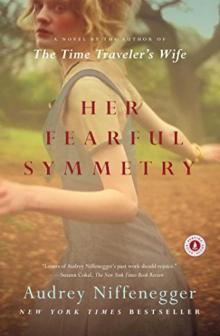 Her Fearful Symmetry
Her Fearful Symmetry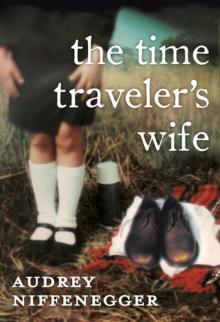 The Time Traveler's Wife
The Time Traveler's Wife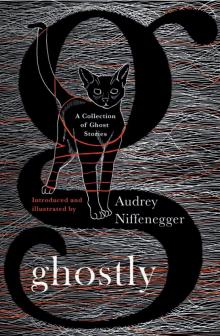 Ghostly: Stories
Ghostly: Stories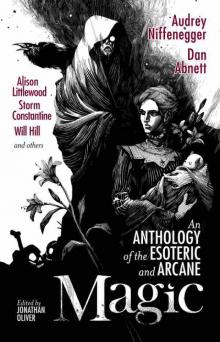 Magic
Magic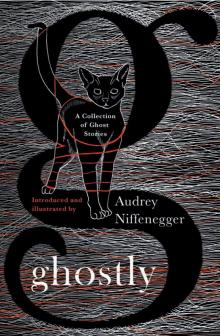 Ghostly
Ghostly